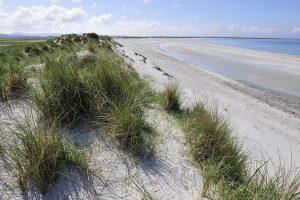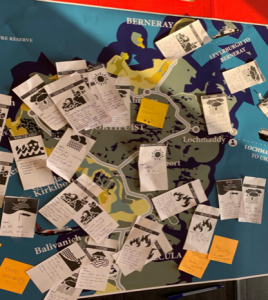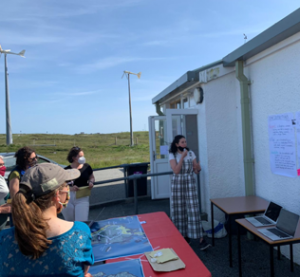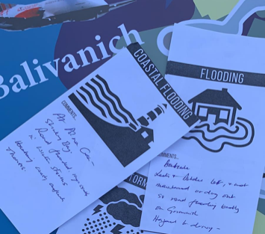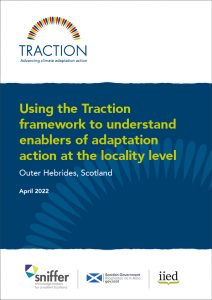![]()
In this case study
Who used the Traction framework?
Where is the group in its adaptation journey?
Why did the group think that using the Traction framework would be helpful for them?
What were the key stages of the Traction process – what happened?
What did the group learn from applying the Traction framework?
How are the findings from the Traction process being used to shape next steps?
Who could learn from how the Traction framework has been used in the Outer Hebrides?
Using Traction in the Outer Hebrides, Scotland
Who used the Traction framework?
The framework was used by the Climate Change Working Group of the Outer Hebrides Community Planning Partnership, which engages a diverse set of stakeholders from local government, national government agencies and civil society. The participants included men and women, older and younger people, and both long-term and relatively new members of the Working Group. The approach was embedded into a process where Sniffer, through its role in delivering the Adaptation Scotland programme, was already supporting the Working Group to improve understanding of the impact of climate change across the islands, and to develop local adaptation actions.
Where is the group in its adaptation journey?
In 2019, the Community Planning Partnership established the Climate Change Working Group, which decided to take an initial focus on developing an adaptation plan for the Outer Hebrides. The group, which has a broad range of sectoral and organisational backgrounds, has gathered a significant quantity of data on the history and potential future impact of different climate hazards in the islands based on national climate change information, on the changing landscape and what people value. They are now at the point of analysis and planning – Traction offered a very powerful means to be able to help bring those pieces together.
Why did the group think that using the Traction framework would be helpful for them?
Sniffer proposed using the Traction framework to the Climate Change Working Group, initially as an opportunity for a “stock-take” of their adaptation journey so far. They were happy to accept the proposal. For the Working Group, this offered an opportunity and a space to better understand where they were as a group, and to think forward together. The structure of the framework created a way to discuss what is enabling adaptation progress across the five key themes: visioning and leadership, governance, gathering and use of information, cooperation and justice.
“The group welcomed the offer from Sniffer to use the Traction framework as the group trusts and values Sniffer’s advice and support. I think it would be fair to say that the group was struggling a bit – particularly given the uncertainty around having staff resource to take work forwards – so taking stock and thinking about next steps felt like the right thing to do at the time.”
David Maclennan Chair, Outer Hebrides Climate Change Working Group
What were the key stages of the Traction process – what happened?
From October 2021 to January 2022, Sniffer, as an informed and impartial facilitator, worked with the Climate Change Working Group through a five stage process using the Traction framework.
- Endorsement: Sniffer shared an outline of the framework, and explained its use and purpose to the Working Group. This was endorsed by the group, who agreed that a smaller sub-group would take forward the process.
- Co-design: Sniffer used the five enablers within the Traction framework to create a set of questions to shape the process. These questions were tested and refined with members of the Working Group, to make sure that they were appropriate for the local context. It was crucial that the questions create space for people to discuss what was important for them and their place.
- Conversation: This set of questions was then used to guide a series of online focus group discussions with members of the Working Group. Crucially these focus groups were structured to allow a range of voices to be heard, with different sessions for civil society organisations, local authority representatives, and local leaders, as well as mixed sessions to enable different organizations to listen and speak to one another.
- Validation: From the recordings and transcripts of the focus group discussions, the Sniffer team pulled out key messages, which were then shared with the participants for further feedback, reflection and prioritisation.
- Interpretation: The key messages were then handed over to the Traction participants, who wrote a briefing note on the findings to present back to the Working Group, and develop ideas for what should happen next.
What did the group learn from applying the Traction framework?
The Traction process was seen initially as a space for a “stock-take”, but it provided the Climate Change Working Group with so much more. The way the process and analysis was organised created a safe space and a means for reflection – enabling the group to gather a shared history for the first time, to shine a light on what they found important together, and to think about what needs to happen next as a group.
Importantly, the process enabled Working Group members to frame the importance of diverse community voices to be heard within its work and climate action across the islands, and for different concerns to be raised. In particular, the framework themes of governance, collaboration, and justice gave the group new tools for discussing these issues collaboratively in a connected, systemic way. Representation came through strongly as a key issue – with stakeholders recognising anew the importance of listening to local voices. In particular, a shared understanding emphasised the need to consider the islands of the Outer Hebrides as distinct, diverse places within the island region.
Through the Traction process, the Working Group identified the need for:
- a collective vision and shared understanding of the climate challenge in the Outer Hebrides, connected with wider priorities
- a shared understanding of climate risk and vulnerabilities as a basis for identifying priority actions
- local actions to be grounded in local realities – with civil society playing a key role
- a stronger, more agile, locally-led approach, with mechanisms for community input and leadership
“With hindsight, this would have been an excellent exercise to go through in 2019 when the group first got together.”
David Maclennan Chair, Outer Hebrides Climate Change Working Group
How are the findings from the Traction process being used to shape next steps?
The Traction process acted as a catalyst. It has provided fresh motivation for the Climate Change Working Group, enabling them to both better articulate what they have achieved so far, and to identify priorities for accelerating adaptation action.
The group sought to use the Traction analysis as a basis for a press release to celebrate their work to date, and in January 2022 held a workshop to reflect on the results of the Traction process and identify next steps. In addition, they are now building a road map of action, prioritising resourcing, and identifying “quick wins”.
In particular, the Traction framework opened up space to better recognise the contribution of other organisations beyond the Community Planning Partnership, such as the creative partners involved in the Outer Hebrides Climate Beacon project, and the richness of the contribution of local community groups.
“We’ve agreed to focus on the things we can do with the resources we have for now, and to take time to build the business case for securing additional resources should that be required…the outputs from Traction, and the new offer of support around Climate Rationale and project planning should help us focus on what is needed to take the work forwards.”
David Maclennan Chair, Outer Hebrides Climate Change Working Group
What did the Outer Hebrides experience reveal about how the Traction framework and process could be improved in the future?
The Traction framework was used during the COVID-19 pandemic, so focus groups took place online – meeting face to face could have strengthened the process. The process was led by Sniffer, as an external partner. Whilst further development of the Traction framework could enable local groups to lead this work themselves it was noted that a trusted external facilitator provides a valuable role in allowing for open conversations and reflections to happen.
Who could learn from how the Traction framework has been used in the Outer Hebrides?
The learning from the Outer Hebrides is relevant for places across Scotland, but also for other parts of the world, including the Global South. The framework could be used by intermediary organisations working with communities and place-based partnerships, but also at a higher level by institutions and funders concerned with accelerating climate adaptation and disaster risk-reduction.
